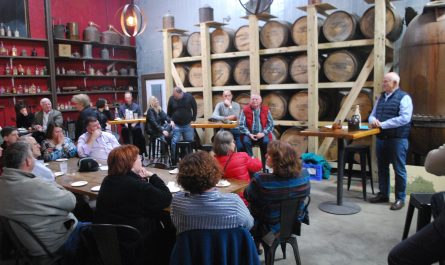The Bootleg King, the Women who Pursued Him, and the Murder that Shocked Jazz-Age America
By Brian G. Miller
New York Times best-selling author and historian Karen Abbott returns to Louisville in March to discuss her book The Ghosts of Eden Park, a story of Prohibition-era bootlegging, gangsters, greed, whiskey, and murder. Abbott will speak to the Filson Historical Society on March 5, and the Bourbon Women social organization on March 6.
Abbott’s narrative fiction book is the true story of George Remus, a Cincinnati attorney who became known as the King of the Bootleggers after using his background in law and working in a pharmacy to become a multimillionaire who eventually controlled more than 35 percent of the liquor in the country.
The meticulously researched book reads like a noir novel, but every line of dialogue was actually said by the characters, gleaned from newspaper stories, court transcripts, and other historical documents.
I spoke to Karen Abbott by phone recently from her home in New York City. Here is some of that conversation:
TBT: Congratulations on your book. Amazing reviews. New York Times bestseller. Lots of attention. Now you’ve got two book appearances next month here in Louisville. Will you come back again when you’re not working?
Abbott: “I love Louisville. I’ve been there for previous book stops. I really want to get back for the Derby. That’s been a longtime goal of mine. I also want to go to a few more distilleries. There are some places that are historically significant in terms of Remus’s story that I’d really like to check out, so I would love to go back to Louisville any time.”
TBT: Let’s talk about George Remus. Almost 100 years after his heyday as the King of the Bootleggers, George Remus has at least 4 books, including yours, written about him. Remus has a brand of bourbon named after him. Yet he remains one of the least known figures, it seems to me, from the Prohibition era. He’s overshadowed by Al Capone and these other folks, mostly because they killed a lot more people. But is that changing?
Abbott: “Yes, exactly. I think you hit the nail on the head there. Number one, Remus considered himself sort of a civilized, gentlemen’s bootlegger, if you will: a gentlemen’s gangster. Despite his obvious mental issues, I think he would find it uncouth to go about killing people like Capone did. I also don’t see Remus dabbling in prostitution or narcotics like Capone did. He sort of held himself apart in that way. He was overshadowed by Capone because obviously Capone was a flashier gangster. Remus built his empire on intelligence, I think, and strategic planning and Capone built his on systematic violence. Of course, Capone got the headlines. But I do think Remus is having a bit of a comeback. He is a significant person in our history. He was America’s most significant bootlegger…just strictly talking alcohol business. I think he has sort of a mystique about him that Capone doesn’t have; the fact that he was one of the inspirations for Jay Gatsby and the fact that he had these social aspirations. I say in the book, there’s no hard evidence that Remus and (F. Scott) Fitzgerald ever met, but I do think there are some incredible parallels between Remus and Gatsby; they both threw these lavish parties, they were both obsessed with an enigmatic woman, and I think they both longed to inhabit a world that did not want to have them. They longed to belong somewhere that really was not interested in inviting them in. I think that sort of melancholy also underlines Remus’s story and makes people interested in him. He’s sort of a mystery himself.”
TBT: Tell me what made you want to tell this story. I read that you became interested in George Remus after seeing a portrayal of him on the HBO series Boardwalk Empire. Is that true?
Abbott: “I did. I love the era. I love Prohibition. I love the Roaring 20s. I was immediately drawn into the show. They would have this character who would come on, mostly for comic relief, talking about himself in the third person. He had these great scenes where it’s kind of a ‘Who’s on First/Abbott and Costello’ skit where Remus says, ‘You must come to Remus.’ And Capone says, ‘Wait, ain’t you Remus?’ I was like, who is this guy? Many of the characters in Boardwalk Empire were based on real historical figures. I wondered if Remus was also a real historical figure, and indeed he was. I love the fact that he did in fact speak of himself in the third person. That wasn’t an invented quirk for television. The more I read about him the more I became fascinated by him. His staggering ability to read the situation of Prohibition and capitalize on it in a way that nobody else had. Altogether his story was stranger than fiction, most definitely the strangest story I’ve ever come across in researching history. How do you make this up? This bootlegger who speaks of himself in the third person and has this crazy personality, his wife falls in love with the prohibition agent who put him in jail. You can’t make that up. I couldn’t believe nobody had told it as a narrative. (Whistling in the background.) I’m sorry, my parrot is whistling, I don’t know if you can hear him. Once I start talking he likes to chime in and let people know he’s around.”
TBT: It sounds like he’s having a good day. Your book reads like this wonderful novel, but every piece of dialogue is actually a direct quotation from the real person. Much of it you got from reading more than 5000-plus pages of trial transcripts. Tell me about your exhaustive research process.
Abbott: “Researching is the part I like most. If I could research a book for 10 years and just not get around to publishing it, I’d be fine with that. It’s kind of the next best thing to time travel. Every day you wake up and get to steep yourself in this research and you forget it’s 2018 or whatever and you immerse yourself in this time, and this place. It becomes so real to you that it’s almost jarring to you when you shut your computer down at the end of the day and have to go back to real life. It’s very rare that a trial transcript from the 1920s would survive. That was an incredibly lucky, fortuitous development in my research, that this had been saved. It was incredible because it’s definitely the kind of thing that people who write narrative history, like I do, need. When you want to tell a novelistic story, without making anything up, then you really need details. Details are the key. The transcript was full of details that allowed me to do that. When somebody takes the stand at a trial, they’re saying, ‘I said this. He said this. I was wearing this. I was thinking this. Somebody did this’. It gives you all the tools you need to really create cinematic scenes. Some of my favorite scenes I’ve ever come across in any book were in that trial transcript. You really got access to what Remus was thinking, his thought processes, and it allowed me to understand him better as a character. It took me about four months to go through that trial transcript and take notes. The notes numbered about 80,000 words, almost as long as the book itself. I loved every minute of it.”
TBT: Among several other awards, Ghosts of Eden Park was nominated for an Edgar Award by the Mystery Writers of America in the Best Fact Crime category. How does it feel to be nominated for the top award in mystery writing?
Abbott: “I was really honored. It’s been a distant dream of mine to be nominated for an Edgar and the other people in the category are all so fantastic. Of course, I’d love to win, but I’m just thrilled to be out there and know that people enjoyed Remus’s story and actually read it as if it were a mystery.”
TBT: I recall that when you spoke at Carmichael’s Bookstore on the book tour last fall, you never really came out and talked about what was ‘the murder that shocked the Jazz Age.” Are you worried about spoilers for something that happened a hundred years ago?
Abbott: “I really wanted to create a ‘whodunit.’ Imogene (Remus’s second wife) and Remus were both people who were capable of murder, I think. There was so much great stuff in the trial transcript that I thought it would be a shame not to use excerpts of it, just to plant some clues, to suggest some red herrings. I really liked the idea of non-fiction being able to be a whodunit. The book is a fun, rollicking tale of the 1920s, but to me, it was also a serious study of deception and how far people can go, not only in deceiving others but in deceiving themselves.”
TBT: In addition to Imogene, there’s another strong woman who figures in the George Remus story. How have your readers, especially women, have reacted to her?
Abbott: “People are really interested in Mabel (Walker Willenbrandt) and it doesn’t surprise me. I think she’s a fascinating character who’s worthy of her own narrative book. She was an incredible woman, 32-years-old, fresh out of law school, never prosecuted a single case in her career, and suddenly the Harding administration appoints her to be in charge of all the Prohibition cases. It’s really not difficult to see why Harding thought she’d be a good choice: ‘Let’s put the little lady in there, she’s going to be overwhelmed and not know what she’s doing, and we’ll be able to continue our cozy relationship with bootleggers.’ Of course, the great surprise of that is that she gets in there and begins kicking ass. And kicking ass when she has this severe handicap; she was almost entirely deaf. I can’t imagine the strain on her, being in this position with an ailment that she didn’t want people to know about. She went to great lengths to conceal her deafness. And the sexism, of course. Women are still dealing with that in politics 100 years later, so you can just imagine how constant and deep that ran back in the 1920s and the things she had to deal with.”
TBT: Your book is so visually evocative and cinematic. It would make a great neo-noir film. Can we expect a Ghosts of Eden park screenplay from you? If someone doesn’t make this into a movie, they’re missing a huge bet.
Abbott: “From your mouth to Hollywood’s ear! It is definitely the most cinematic book I’ve ever written. As of yet, the rights have not sold. I try not to think about the Hollywood stuff too much because it’s the one thing you really have no control over. I’ve had other books of mine to be optioned. There’s always a little seed of hope that something might come out of it.”
TBT: We’ll keep our fingers crossed.
Abbott: Thank you.
The Filson Historical Society event will take place Thursday, March 5 from 6 to 7 p.m. at 1310 South 3rd street. Tickets are free for Filson members and $15 for non-members. Click here for ticket information.
The Bourbon Women Book Night with Abbott is Friday, March 6 at the Oxmoor Farm Library from 6:30 to 8:00 p.m. Tickets are $20 for Bourbon Women member and $35 for no-members. The event will feature lite bites and cocktails and is sponsored by Carmichael’s Bookstore and George Remus Bourbon. Click here for ticket information.
Photo courtesy of Penguin Random House Books.





